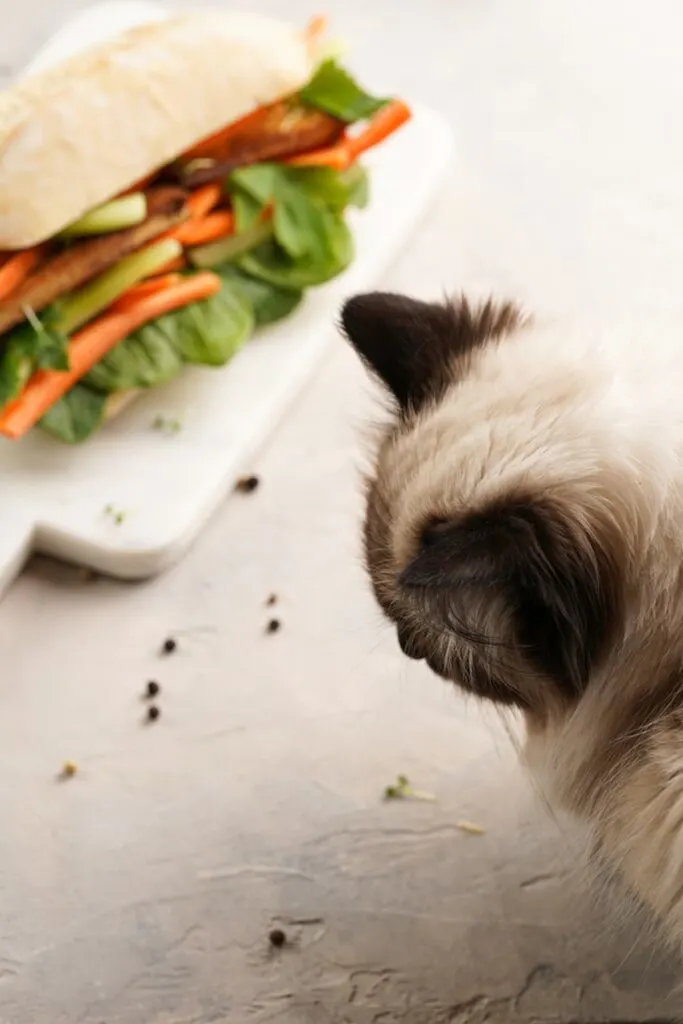You have been working on your chef skills and studying your favorite cooking shows for long enough. It is time to start eating healthier and using natural, more nutritious foods for your diet. The saying “curiosity killed the cat” comes to mind, as you know how difficult it is to keep cats off your kitchen tables and counters. If you are thinking about growing herbs in your house, you may be concerned about whether certain herbs pose a threat to your feline friends. Can cats eat cilantro? What are the possible side effects for a cat that has eaten cilantro?
Cats can, in fact, eat cilantro. Although cilantro is non-toxic to cats, too much can cause an upset stomach and, in some cases, certain medical issues.
Now that you know tiny amounts of cilantro will not harm your furry friend, let us dive in a little deeper into the benefits and possible side effects of too much cilantro and potential health benefits.

Is cilantro appealing to cats?
To cats, cilantro is appealing due to the chewy leaves and distinctive scent it gives off.
Not all cats will be drawn to cilantro, but the fresh cilantro you have been growing in your herb garden gives off a bright green glow with fluffy, chewable petals that most cats will find hard to resist. The leaves are chewy, and the scent is appealing. Dry cilantro is less appealing to cats, but if left out on a counter can quickly become a mess of kitty fun.
Are there health benefits to cats eating cilantro?
In small amounts, cilantro can have certain health benefits for your cat. Also, keep in mind that cilantro is not essential to your cat’s diet, so if you attempt to give your cat cilantro as a treat and they do not like it, that is okay!
What is cilantro?
Cilantro, otherwise known as “Chinese parsley” or coriander, is a natural herb commonly used for cooking different cuisines worldwide. Cilantro leaves can be used fresh, right out of your garden, or in a dehydrated, chopped-up form. The stems and roots can be chopped and used for a more intense spice.
Beneficial nutrients in cilantro
Whether your kitty has gotten into your house plants and eaten the herbs you were growing for your upcoming cooking plans, or whether you decided to try to treat them to a taste of it, cilantro contains several beneficial supplements such as:
- Proteins and fats
- Carbohydrates
- Vitamins: A, B, C, E, K
- Calcium
- Iron
- Zinc
- Sodium
It is important to remember that if you plan on giving your cat cilantro, you only give them a small amount. Too much can cause digestive and stomach issues, such as vomiting and diarrhea.
Other health benefits
In small increments, cilantro could be a good treat for your cat every once in a while.
Every added nutrient is good for your feline companion. Different vitamins and minerals benefit certain bodily functions.
Cilantro is also a significant source of fiber, which aids in keeping your cat’s digestive tract healthy. It also contains antioxidants and is anti-inflammatory, making it an excellent supplement for older or recovering cats. Antioxidants help reduce cancer risk, and its anti-inflammatory elements help promote healthy kidneys.
Health Risks
A few health risks could appear if your cat eats too much cilantro, such as gastrointestinal irritation and cardiac arrhythmia.
Although there are some risks, the chance that a problem such as these will arise is very slim. Cats have robust digestive systems, originally intended to break down mass amounts of fats and proteins.
The most common ailment after your cat eats cilantro is an upset stomach. If this occurs, the best thing to do would be to keep the cat hydrated and watch them until the illness passes.
Four other cat-friendly herbs
There are other herbs that veterinarians encourage cat owners to treat their feline friends with, such as:
- Catnip – helps reduce pain and anxiety in cats. It is also used in some cases of separation anxiety if your cat has issues being left at home alone for more extended periods.
- Cat Thyme – known to help relieve hot spots, rashes, and anxiety in cats.
- Valerian – is also known to alleviate pain and stress in cats. It also promotes a more active cat, including more playtime and exercise.
- Cat’s Claw and Dandelion Root – are used to help aid cats that suffer from bad itching and allergies.
Final Thoughts
Some cats like cilantro, while others may find it repulsive. If your cat gets into your homegrown plants, there are a few health benefits, such as higher digestive health and reduced chances of cancer and stress. The health concerns with cats eating cilantro are the slim possibilities of gastrointestinal issues and upset stomachs. In conclusion, cilantro is considered non-toxic for cats, and in some ways, it may benefit them. So, grow that in-home cilantro for cooking.

My name is James, and welcome to FAQCats!
Along with our team of cat owners, expert pet enthusiasts, and pet professionals, we aim to write engaging helpful, engaging content about cats. At FAQCats we strive to provide content that’s accurate and fun to read. Our team writes about everything related to cats; even the most complex of topics. Through extensive research and caring for our own fur-pals, we’re able to provide something cat owners worldwide will love. Have a look around, and leave us feedback anytime!

